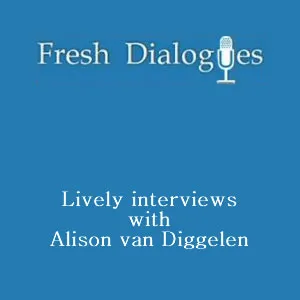Homeless & Addicted in Silicon Valley: One Woman’s Solution
- Author
- Alison van Diggelen
- Published
- Thu 25 Oct 2018
- Episode Link
- https://www.freshdialogues.com/2018/10/25/homeless-and-addicted-in-silicon-valley-one-womans-solution/
Over 100 Americans die every day from opioid overdose, that’s about 40,000 a year. What can be done to reverse the recent spike in fatalities? In San Francisco, a team of public health workers is focused on treating the most vulnerable: homeless people on the city’s streets. My latest report for the BBC explores how this special ops “Street Team” is finding and convincing people to get the latest medical treatment, wherever they are.
It’s a timely issue as next month, San Francisco voters will decide if the city’s largest businesses, many of them tech companies, should pay a special tax to help fund more homeless shelters and addiction centers like the one I visited. The debate is dividing the tech community. Marc Benioff of Salesforce says “homelessness is everyone’s problem” and backs the special tax, but others like Twitter’s Jack Dorsey say it’s “unfair.” Love it or loathe it, the ballot measure proposes more funding and action to tackle homelessness and drug addiction in our most vulnerable population. These are complex and deep rooted problems with no quick fixes, but I applaud Marc Benioff and others like him for taking a stand.
Several medical workers and a heroin addict shared their ‘dream’ solutions to homelessness and addiction in the city. Their answers may surprise you.
If I had a magic wand, I’d just flash over the Twitter building, the Google building and say: hey guys, how about some compassion for folks, some kindness? When somebody talks to you in the street, look them in they eye. Planting that little seed of compassion and kindness goes a long way and I think that’s how the larger change in our city would happen. There’s a lot of hostility, a lot of misinformation. So if I had a magic wand, I’d just like flash it and say: compassion, compassion, compassion…kindness and a safe injection site! Ana Cuevas, health worker at the Tom Waddell Health Center, SF Public Health [Pictured above]
Listen to my report at the BBC’s Health Check Program (Ebola episode: starts at 8:49)
Check out the Fresh Dialogues podcast or below
http://www.freshdialogues.com/wp-content/uploads/2018/10/Fresh-Dialogues-podcast-homeless-addicted-SF-Oct-2018.mp3
Here’s a transcript of my full report. A shorter version aired on the BBC World Service on October 24, 2018.
Atmos: San Francisco city street sounds: bus, cars, fans, people…
Alison van Diggelen: I’m here at City Hall in the center of San Francisco. Within yards of the building’s gleaming dome, there are clusters of homeless people, huddled in doorways, sprawled on pavements, or slowly pacing the streets.
Every week, Dr Barry Zevin and his team walk the city streets to build rapport with homeless people with addiction problems and offer on-the-spot treatment. Once trust is established, they encourage patients to visit the city’s public health clinic. Today, there’s a steady stream of homeless people…
Alison van Diggelen: Inside this clinic, known as the Tom Waddell Health Center, I meet James (not his real name) a former medic in the United States army, who recently started treatment for heroin addiction.
James: Right now I got a prescription refilled, and the doctor was like: do you need a shelter bed for tonight? Are there other things I can do for you? I’m very impressed with how kind and helpful they are…going above and beyond to find what else they can do for me.
Alison van Diggelen: James, who’s 30, has been prescribed buprenorphine to help wean him off his opioid addiction. Buprenorphine is a daily pill that reduces opioid cravings and the extreme physical pain of withdrawal. Despite being an addict for over ten years, James sincerely wants to change.
James: This medication allows me to do a detox less painfully and I no longer will have intense cravings for the substance of abuse. It’s definitely more comfortable than cold turkey…
Alison van Diggelen: James has been homeless in SF for [...]
